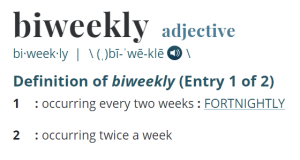I’m not a big asker of questions, even in the best situations, and it’s something I’ve come to terms with.
So imagine my surprise when, during my interview for this very position, I (somewhat jokingly) asked whether “biweekly” meant twice a week, or once every two weeks.
We settled on using “fortnightly” to indicate every two weeks and moved on.
Little did I know that this conversation was foreshadowing the crisis I've been dealing with the past few weeks.
Now, I interviewed in September, and it is March. You might be wondering what happened to reignite my confusion and frustration regarding the “B” word. Well, I read it in a book and decided to google it.
Now, before we go any further, what do you think biweekly means?
Because guess what, it means twice a week.

And once every two weeks.
It means
both.
Great idea, right? Somebody out there really thought this one through.
And that’s not even the extent of the problem- the dictionary people
know. Merriam-Webster actually published an article on the usage of ‘biweekly’ and ‘bimonthly’ (yes, bimonthly is a problem too), where they basically tell you to avoid using them.
Oh- but you can use biannually. You want to know why? Because biannual means twice a year, and
biennial means once every two years.
Does this mean that at some point, somebody recognized the problem with the prefix "bi", and then only fixed
some of the words?
This all has a point beyond anger and frustration, I promise, but one more thing. The following conversation technically makes complete sense. Just mull that over as you read this:
Person 1: “We will be meeting biweekly for the rest of the year.”
Person 2: “Wait, what do you mean by ‘biweekly’?”
Person 1: “Oh, you know, bimonthly.”
Person 2: “Ah, that makes perfect sense, thank you.”

Okay, I'm done. The (somewhat vague) purpose to my angry rambling:
Exams are nearly upon us, and that means understanding course content is a source of serious stress. Like I mentioned earlier, asking questions has never been my forte, and as a result I’ve dug myself into holes that have kept me awake at night; holes that wouldn’t be there if I’d had the confidence to ask questions.
I’m sure you’ve heard the saying “there’s no such thing as a stupid question”, but how many of us actually believe that? Have you ever had an experience where you weren’t clear on something, but didn’t ask because you were convinced you were the only person with the problem?
I have, many a time.
And this whole ‘biweekly’ escapade has reminded me of an important lesson about why I don’t have to be as nervous about asking questions:
I’m terrified of looking like I wasn’t paying attention, and I’m terrified of making another person feel like they haven’t explained something well. But look at it this way, if you don’t understand something it is
nobody’s fault… Understanding a situation relies on so many factors; like, for example, whether or not the word has two totally different meanings when used in the same context.
(Yeah, I’m looking at you,
biweekly.)
This hasn’t stopped me from feeling nervous about asking questions, but it does help me remember that every question is worthwhile. To help make sense of this, I try looking at it this way: how would you feel if somebody asked you the question you would like to ask?
Chances are, you wouldn’t mind.
And if you would, blame the dictionary. After all, the best
they could do in this situation is “sorry, not sorry.”
Not that I’m bitter.

-
Hi,
Sorry that this is up so late! I ended up falling asleep when I meant to post the draft online. I'm working on the interview one, but I'm not sure it's at a place where it can be ready for posting tomorrow. Also, as I was taking the screenshots for this post everything seemed really familiar, and I was wonder if we had realized all of this back in September and I've just forgotten!
Let me know if you want me to change anything, or write a different post. I have some time on Wednesday if this isn't something that would work!
Thanks,
Tanith
 And once every two weeks.
It means both.
Great idea, right? Somebody out there really thought this one through.
And that’s not even the extent of the problem- the dictionary people know. Merriam-Webster actually published an article on the usage of ‘biweekly’ and ‘bimonthly’ (yes, bimonthly is a problem too), where they basically tell you to avoid using them.
Oh- but you can use biannually. You want to know why? Because biannual means twice a year, and biennial means once every two years.
Does this mean that at some point, somebody recognized the problem with the prefix "bi", and then only fixed some of the words?
This all has a point beyond anger and frustration, I promise, but one more thing. The following conversation technically makes complete sense. Just mull that over as you read this:
Person 1: “We will be meeting biweekly for the rest of the year.”
Person 2: “Wait, what do you mean by ‘biweekly’?”
Person 1: “Oh, you know, bimonthly.”
Person 2: “Ah, that makes perfect sense, thank you.”
And once every two weeks.
It means both.
Great idea, right? Somebody out there really thought this one through.
And that’s not even the extent of the problem- the dictionary people know. Merriam-Webster actually published an article on the usage of ‘biweekly’ and ‘bimonthly’ (yes, bimonthly is a problem too), where they basically tell you to avoid using them.
Oh- but you can use biannually. You want to know why? Because biannual means twice a year, and biennial means once every two years.
Does this mean that at some point, somebody recognized the problem with the prefix "bi", and then only fixed some of the words?
This all has a point beyond anger and frustration, I promise, but one more thing. The following conversation technically makes complete sense. Just mull that over as you read this:
Person 1: “We will be meeting biweekly for the rest of the year.”
Person 2: “Wait, what do you mean by ‘biweekly’?”
Person 1: “Oh, you know, bimonthly.”
Person 2: “Ah, that makes perfect sense, thank you.”
 Okay, I'm done. The (somewhat vague) purpose to my angry rambling:
Exams are nearly upon us, and that means understanding course content is a source of serious stress. Like I mentioned earlier, asking questions has never been my forte, and as a result I’ve dug myself into holes that have kept me awake at night; holes that wouldn’t be there if I’d had the confidence to ask questions.
I’m sure you’ve heard the saying “there’s no such thing as a stupid question”, but how many of us actually believe that? Have you ever had an experience where you weren’t clear on something, but didn’t ask because you were convinced you were the only person with the problem?
I have, many a time.
And this whole ‘biweekly’ escapade has reminded me of an important lesson about why I don’t have to be as nervous about asking questions:
I’m terrified of looking like I wasn’t paying attention, and I’m terrified of making another person feel like they haven’t explained something well. But look at it this way, if you don’t understand something it is nobody’s fault… Understanding a situation relies on so many factors; like, for example, whether or not the word has two totally different meanings when used in the same context.
(Yeah, I’m looking at you, biweekly.)
This hasn’t stopped me from feeling nervous about asking questions, but it does help me remember that every question is worthwhile. To help make sense of this, I try looking at it this way: how would you feel if somebody asked you the question you would like to ask?
Chances are, you wouldn’t mind.
And if you would, blame the dictionary. After all, the best they could do in this situation is “sorry, not sorry.”
Not that I’m bitter.
Okay, I'm done. The (somewhat vague) purpose to my angry rambling:
Exams are nearly upon us, and that means understanding course content is a source of serious stress. Like I mentioned earlier, asking questions has never been my forte, and as a result I’ve dug myself into holes that have kept me awake at night; holes that wouldn’t be there if I’d had the confidence to ask questions.
I’m sure you’ve heard the saying “there’s no such thing as a stupid question”, but how many of us actually believe that? Have you ever had an experience where you weren’t clear on something, but didn’t ask because you were convinced you were the only person with the problem?
I have, many a time.
And this whole ‘biweekly’ escapade has reminded me of an important lesson about why I don’t have to be as nervous about asking questions:
I’m terrified of looking like I wasn’t paying attention, and I’m terrified of making another person feel like they haven’t explained something well. But look at it this way, if you don’t understand something it is nobody’s fault… Understanding a situation relies on so many factors; like, for example, whether or not the word has two totally different meanings when used in the same context.
(Yeah, I’m looking at you, biweekly.)
This hasn’t stopped me from feeling nervous about asking questions, but it does help me remember that every question is worthwhile. To help make sense of this, I try looking at it this way: how would you feel if somebody asked you the question you would like to ask?
Chances are, you wouldn’t mind.
And if you would, blame the dictionary. After all, the best they could do in this situation is “sorry, not sorry.”
Not that I’m bitter.
 -
Hi,
Sorry that this is up so late! I ended up falling asleep when I meant to post the draft online. I'm working on the interview one, but I'm not sure it's at a place where it can be ready for posting tomorrow. Also, as I was taking the screenshots for this post everything seemed really familiar, and I was wonder if we had realized all of this back in September and I've just forgotten!
Let me know if you want me to change anything, or write a different post. I have some time on Wednesday if this isn't something that would work!
Thanks,
Tanith
-
Hi,
Sorry that this is up so late! I ended up falling asleep when I meant to post the draft online. I'm working on the interview one, but I'm not sure it's at a place where it can be ready for posting tomorrow. Also, as I was taking the screenshots for this post everything seemed really familiar, and I was wonder if we had realized all of this back in September and I've just forgotten!
Let me know if you want me to change anything, or write a different post. I have some time on Wednesday if this isn't something that would work!
Thanks,
Tanith
0 comments on “Asking Questions is Scary, but “Biweekly” is Scarier”